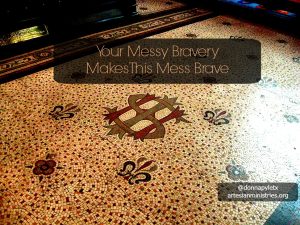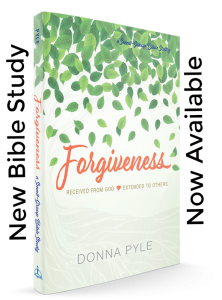You have gathered close and invited me across state lines and beyond our country’s borders for one simple, profound privilege: to huddle our hearts together around God’s Word.
And I’ve seen you come from all over — bags packed, faith intact, and prayers offered with the desire to go deeper with God. You did it again just a few weeks ago as we gathered at my home church to tape a new DVD Bible study series in partnership with the LWML.
And I have to tell you:
You are brave.
Every.
Single.
One.
Of.
You.
You have come regardless of insecurities and difficulties, not knowing if you would belong. Hoping to fit in somewhere. And it’s as if I’m looking in a mirror.
We come with our stories searching to see how they fit into His bigger story — because that is what we have. Stories. God’s Word shining light on our lives to write stories that bleed, heal, and bless.
The lines of our stories become life-lines we share with each other when life’s storms blow hard.
Jesus often taught through stories called parables. Because people can relate to stories.
In the midst of our brave story-sharing, we discover there are a whole lot of other women out there who are a bit of a mess just like us. Messy because of those days we have to fight for joy when the enemy pulls out his arsenal. Messy because we long for eternity while living in a fallen world.
We are a mess — you and I — saved by grace. A brave mess. Brave because each day you get out of bed despite wanting to pull the covers over your head until the aches and disappointments subside.
We brave the harsh world to share our messy stories because other women need to know perfection this side of heaven is an illusion.
And as we gather around His Word, sharing our messy stories, the Spirit of God can bind our wounds. He can take away the sting of loneliness and restore joy despite the laundry heap, crying kids, bruised marriages, and frayed dreams.
Please keep getting out of bed.
We need your messy, real, authentic, unmasked stories trusting that in the hands of the Spirit, the stories become salve to the battered souls. Because as we gather in community around God’s story, the Word is made flesh in our own lives.
I need your messy story… and you need your messy story. We need people who will tell us their story, not their sermons — their thrashing, not their theology. Because we need to know that we aren’t the only messy ones.
You are BRAVE.
Your bravery makes me brave.
And together we bravely face this world armed with the Sword of the Spirit that reveals the life-altering story of a Resurrection Easter love written for all. So we suit up.
Not because we, the messy, are perfect.
But because of the perfect One who wasn’t afraid of our messes and risked it ALL to write the perfect ending to our stories.
Thank you for being brave.






